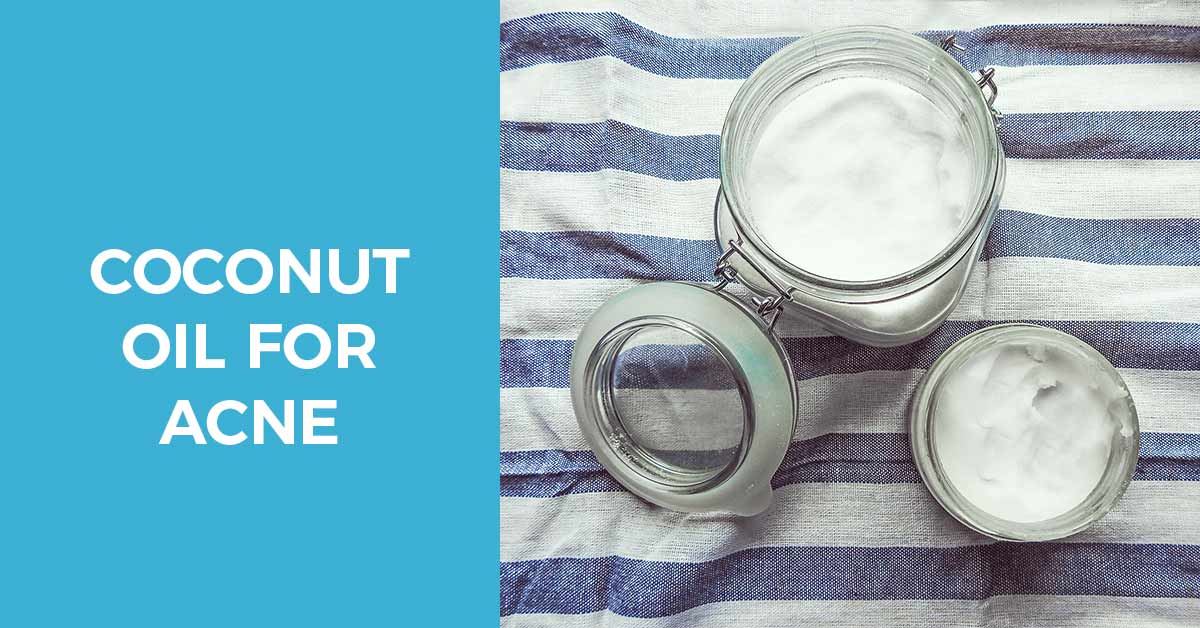From hair treatments to body butters, coconut oil certainly gets around. But when you’re suffering from an acne breakout, is it really going to help clear up those spots, or will it just make them worse?
There’s no denying the fact that, coconut oil is hailed for its natural beauty and wellness properties, which is why you’ll find it as one of the key ingredients in many products. As a hydrating oil, it’s great for using in moisturizers for your body, face, and hair – and it’s extremely tasty, too!
However, when you hear about people using it to treat acne, you’d be forgiven for questioning their intentions. When you’re suffering from a breakout that’s caused by excess oil, do you really want to add more oil to your skin?
We wanted to take a closer look at this acne-busting solution to see how it works, who should use it, who shouldn’t use it, and how you should apply it to your face. We’ve even thrown in some fabulous homemade face masks you can try at home for the ultimate, indulgent, spot-defying treat!
What Causes Acne?
Before we get into the ins and outs of coconut oil, let’s just recap on what causes acne.
Acne starts when your skin’s pores become clogged up with dead skin cells and oil. These pores are tiny little holes in your skin, also known as hair follicles, and each of these has a sebaceous gland. This gland produces oil (called sebum) to keep your skin supple and hydrated, but when it over produces this oil, it can clog up your pores, especially if dead skin cells and dirt are added into the mix.
When your pores become blocked in this way, it creates a breeding ground for bacteria with the types of bacteria that cause acne – Propionibacterium acnes (P. acnes) – thriving in this space. Once the bacteria grow, they get trapped in your pore, and because they’re a foreign body, your white blood cells will try to fight them. That’s why your skin often becomes red and inflamed when you have acne.
Other symptoms of acne include pimples, blackheads, and whiteheads, with more severe cases resulting in pustules, cysts, and other nasty side effects.
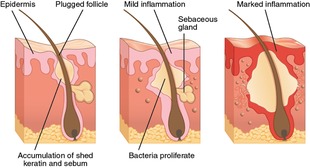
What Causes Acn
A lot of things can contribute to your acne breakouts, including infection, stress, diet, genetics, and hormone changes. And you don’t just have to be a teenager to suffer from it either, because people of all ages can get acne.
The Benefits of Coconut Oil for Fighting Acne
Coconut oil is made up predominantly of medium-chain fatty acids (MCFAs) and these have strong antimicrobial properties, allowing them to target the microorganisms that cause diseases. Furthermore, 50% of these fatty acids are lauric acid, which is thought to be helpful in killing harmful viruses, fungi, and bacteria. In one study, when used on its own, lauric acid killed the P. acnes bacteria.
In another study, these bacteria were more effectively killed by lauric acid than benzoyl peroxide (another popular treatment for acne, which is found in a number of over-the-counter medications). It also demonstrated that the acid had the potential to reduce some of the inflammation caused by the bacteria, too.
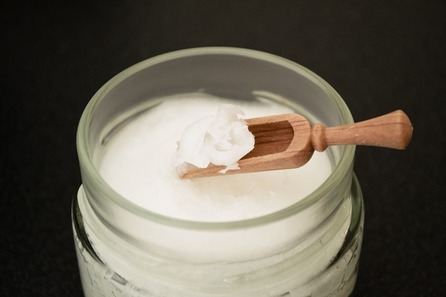
When combined with retinoic acid, further research found lauric acid helps inhibit bacteria that cause acne. What’s more, coconut oil also contains caprylic, caproic, and capric, which are other medium-chain fatty acids, and, although they don’t have the same powerful properties lauric acid has, they can also help in the battle against bacteria-causing acne.
To achieve the great properties of coconut oil, you will need to apply it directly onto your skin because this is where you’ll find the bacteria.
Impressive, isn’t it? But that’s not all, because coconut oil also has some other helpful effects that can help with the inflammation caused by acne as well as the healing process.
The Benefits of Coconut Oil for Fighting Acne
A lot of people who have acne also suffer from damage to their skin, which is what can cause acne scars. In these cases, it’s crucial you’re keeping your skin healthy by moisturizing it frequently, as your skin requires a certain amount of moisture in order to heal properly and fight off any infections.
A study into the effectiveness of coconut oil on dry skin found that it can help relieve the symptoms while also fighting bacteria. Furthermore, other studies have demonstrated that the use of coconut oil is just as effective, if not more so, than using mineral oil.
Coconut oil could even be beneficial when it’s used in the healing process of your skin, helping to prevent any scars from forming. How? One study used rats and treated their wounds with coconut oil, and they found that there was less inflammation on the skin and a higher production of collagen by doing this. This resulted in their wounds healing much faster.
When Is Using Coconut Oil for Acne a Bad Idea?
Coconut oil is very comedogenic, meaning it can clog your pores and make your acne worse. Speaking to Teen Vogue, dermatologist Dendy Engelman suggested that, on the comedogenicity scale, coconut oil is rated 4, with 0 being the least pore-clogging and 5 being the most. However, she also goes on to say that this doesn’t mean you should stop using coconut oil because it’s great as a makeup remover or for introducing into your cleansing routine – but only when you use it correctly (see tips below).
Equally, some studies have found that the anti-inflammatory properties of coconut oil can be achieved by eating it instead of applying it to your face. These studies haven’t been tested on humans, though, so there’s no clear evidence this will help as of yet.
Who Benefits from Using Coconut Oil for Acne?
The people who may benefit from coconut oil most are those who have very dry skin or, believe it or not, very oily skin. When you’ve got acne-prone skin that’s very oily, you’ll often use aggressive astringent products to try and cure it. However, these can strip the natural oils from your skin, having an adverse effect because your skin will start producing even more oil to compensate for this. This may aggravate your acne, placing you in a never-ending cycle.
In fact, what you may need is a little oil. Using coconut oil on your skin can help it bind and mingle with all that excess oil your skin’s producing (sebum), and any lipid-soluble surface dirt. The coconut oil can then work to dislodge and lift out this excess sebum and dirt, drawing out impurities from your skin’s pores while also nourishing your skin with lauric acid, omega-3 fatty acids, and vitamin E. Then, to make sure you aren’t clogging up your pores, you need to try and remove this excess coconut oil, while also getting rid of any impurities and sebum at the same time.
The best way to use coconut oil is to place a small amount in your hands before massaging it to liquefy it – if it’s in its solid stage. Then, start to massage it onto your face, focusing on the specific areas where you’ve used makeup and want to dissolve it or break it up.
Afterward, use a gentle cleanser that will remove any excess oil but without being too harsh on your skin. Ideally, this is a cleanser that’s labeled as being noncomedogenic and is non-foaming.
Furthermore, before you start using coconut oil on a regular basis, you should carry out a patch test first. This involves placing some of the coconut oil onto the inside of your arm, 24 hours before you place it on your face. If, during this time, your skin doesn’t react, it should indicate that you’re safe to use this on your face.
As you can see, coconut oil is a wonderful, natural ingredient, and is perfect for adding into your everyday routine as a moisturizer and anti-inflammatory product. However, it isn’t going to cure your acne on its own, and instead, it needs including in a good skincare regimen that tackles all aspects of your acne.
That’s why we love this video from Sara Grace, where she explains all of the different things she uses coconut oil for, including combatting acne.
How to Use Coconut Oil for Acne in a Face Mask
Business Insider recommends four types of face masks for different skin types, which we’ve included below for you:
Coconut Oil Face Mask for Oily Skin
You need:
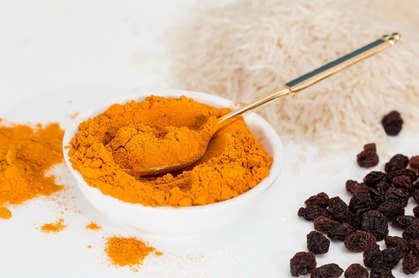
- 1 tablespoon of coconut oil
- 1 tablespoon of turmeric
You may have heard of turmeric as a spice you use in food, but it’s also got fabulous antimicrobial properties (just like coconut oil)! Therefore, this coconut oil and turmeric face mask is perfect for getting rid of dirt and bacteria that can cause acne.
To make it, all you need to do is liquefy the coconut oil by putting it in the microwave for five to 10 seconds. Once done, add in the turmeric and whisk the ingredients together. Now the mask should have a wonderful yellow color, so apply it directly to your skin before leaving it for 10 minutes. You may feel a slight tingling sensation but you shouldn’t experience any burning. And once you remove the mask your skin should feel tight and your pores should look quite a bit smaller than before.
Coconut Oil Face Mask for Patchy, Flaky Skin
You need:
- 2 tablespoons of raw sugar
- 1 tablespoon of coconut oil
Dry, flaky skin can be incredibly irritating, making applying makeup very difficult. And, even though skin experts warn against exfoliating your skin too much, there are benefits to giving it a good exfoliation treatment a couple of times a week. Using natural ingredients you can get rid of peeling, flaky skin so it feels beautifully smooth again.
When putting this mask together you don’t need to melt the coconut oil. Instead, just use a fork to mash it up until it takes on a smooth consistency. Then, create a paste by mixing in the sugar before applying it evenly to your skin. Leave the mask for 5 minutes before rubbing it into your skin for thirty seconds. Once done, rinse the mask off your face to uncover smooth, hydrated skin.
Coconut Oil Face Mask for Dry Skin
You need:
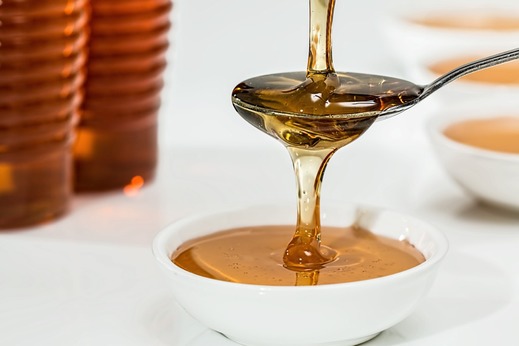
- 1 tablespoon of coconut oil
- 1 tablespoon of honey
- 1 tablespoon of plain yogurt
If you’re suffering from dry skin, this mask adds another layer of hydration by using honey and yogurt as well as coconut oil. What’s more, this mask is also great for sensitive skin that needs calming down because it doesn’t just moisturize but helps reduce any redness and soothes your complexion.
To make, just liquefy the coconut oil in the microwave for around 10 seconds before mixing in the yogurt and honey with a whisk until everything is blended together nicely. Apply to your skin and leave it for up to fifteen minutes to give your skin chance to absorb the properties of this amazingly hydrating mask. Then, rinse the ingredients off your face before applying a moisturizer.
Coconut Oil Face Mask for Dull Skin
You need:

- 1 tablespoon of coconut oil
- The juice of half a lemon
- 1 tablespoon of honey
When you feel as though your skin’s not looking as vibrant as it normally does, or you want to inject a bit of extra glow into your skin, this mask is ideal. Simply use it before you apply your makeup for a radiant, natural finish.
Start by liquefying the coconut oil in the microwave before mixing the honey into it. Then, squeeze the juice of half a lemon into the mixture before giving it a good stir. A quick five minutes for this mask is fine because, if you leave it any longer, the lemon juice can start to irritate your skin. After you’ve rinsed the mask off your face, you should notice a much fresher, brighter look to your skin.
Should You Start Using Coconut Oil for Acne
Hopefully, the above information has provided you with a great overview of coconut oil, its benefits and when you should use it. But let’s recap some key points before you go ahead:
- Due to its high content of lauric acid, coconut oil can help kill the type of bacteria that contribute toward acne
- When applying coconut oil directly to your skin, it can increase moisture and kill bacteria, and it may also reduce acne scarring
- Coconut oil is comedogenic, which means it can be a problem for people who have oily skin and it does need using along with other cleansers, moisturizers, etc. to have the best results
- Before proceeding with coconut oil, you should do a test patch first, and may want to seek the advice of your dermatologist
- Eating coconut oil could benefit your skin without adding more oil to it
- The best coconut oil to use is virgin coconut oil as it has no other added ingredients and is in its purest form
If you are concerned about using coconut oil on your face, try using it in small doses several times a week to see if you notice any benefits or side effects – and don’t forget to use your standard cleanser to remove any excess oil after you’ve used it.
Have you ever used coconut oil to treat your acne? Did you notice an improvement or did it make your acne worse? We’d love to hear your stories in our comments box below.

